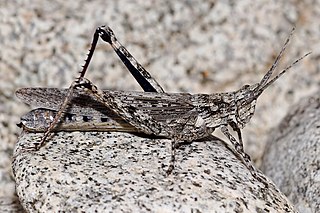
Acrididae are the predominant family of grasshoppers, comprising some 10,000 of the 11,000 species of the entire suborder Caelifera. The Acrididae are best known because all locusts are of the Acrididae. The subfamily Oedipodinae is sometimes classified as a distinct family Oedipodidae in the superfamily Acridoidea. Acrididae grasshoppers are characterized by relatively short and stout antennae, and tympana on the side of the first abdominal segment.
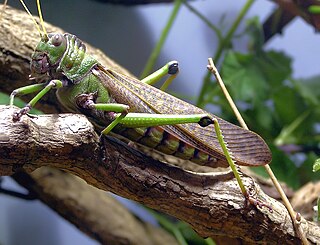
The Romaleidae or lubber grasshoppers are a family of grasshoppers, based on the type genus Romalea. The species in this family can be found in the Americas. It is known to be polyphagous, but there is not much else known regarding its diet.

Eumastacidae are a family of grasshoppers sometimes known as monkey- or matchstick grasshoppers. They usually have thin legs that are held folded at right angles to the body, sometimes close to the horizontal plane. Many species are wingless and the head is at an angle with the top of the head often jutting above the line of the thorax and abdomen. They have three segmented tarsi and have a short antenna with a knobby organ at the tip. They do not have a prosternal spine or tympanum. Most species are tropical and the diversity is greater in the Old World. They are considered primitive within the Orthoptera and feed on algae, ferns and gymnosperms, the more ancient plant groups.

Eumastacoidea is a superfamily within the order Orthoptera, suborder Caelifera. The family has a mainly tropical distribution and have sometimes been called "monkey grasshoppers".

The Trigonopterygoidea are an insect superfamily in the Orthoptera: Caelifera. Sometimes described as leaf grasshoppers, American species in the Xyronotidae have also been called razor-backed bush-hoppers.

Dericorythidae are a family of grasshoppers, in the Orthoptera: suborder Caelifera. Species in this family can be found in northern Africa, southern Europe and Asia.

The Hemiacridinae are a subfamily of Acrididae in the Orthoptera: Caelifera. Species can be found in Africa and Asia.

The Orthacridinae are a sub-family of grasshoppers in the family Pyrgomorphidae. Species are found in: Central America, Africa, Asia, Australia and certain Pacific Islands. The type genus is Orthacris and the taxon proposed by Bolívar in 1905.

The Erianthinae are a subfamily of Asian grasshoppers in the family Chorotypidae and based on the type genus Erianthus. There are currently 12 genera and more than 40 described species recorded from southern China, Japan, Indo-China and Malesia.
Gonista is a genus of grasshoppers in the family Acrididae, subfamily Gomphocerinae, and tribe Ochrilidiini; species are distributed in China and SE Asia.
Stenerianthus annamensis is a species of grasshopper in the monotypic genus Stenerianthus. It is in the family Chorotypidae, subfamily Erianthinae. This "monkey grasshopper" was discovered in central Vietnam, with the type locality identified as "Lien Chien" near Da Nang.

Episactidae is a family of grasshoppers in the order Orthoptera. There are about 19 genera and more than 60 described species in Episactidae, found in Central and South America, China, and Madagascar.
Euschmidtiidae is a family of grasshoppers in the order Orthoptera. There are at least 60 genera and more than 240 described species in Euschmidtiidae, found in Sub-Saharan Africa and surrounding islands.

Acinipe is a genus of grasshoppers in the family Pamphagidae. There are more than 20 described species in Acinipe, found in Southern Europe and North Africa.
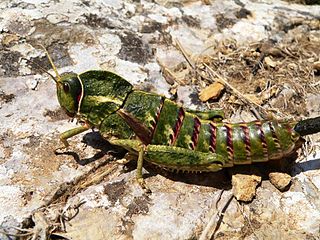
Pamphagus is a genus of grasshoppers in the family Pamphagidae. There are about 12 described species in Pamphagus, found in southern Europe and northern Africa.

Paracinipe is a genus of grasshoppers in the family Pamphagidae. There are about 18 described species in Paracinipe, found in northern Africa and the Middle East.
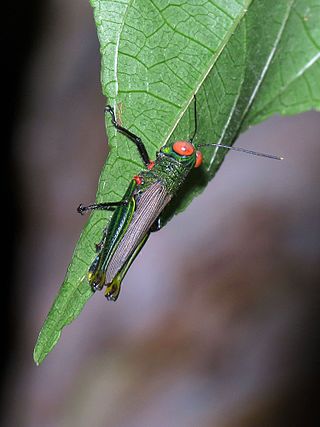
Proctolabinae is a subfamily of grasshoppers in the family Acrididae. There are more than 20 genera and 210 described species which are found in South America.
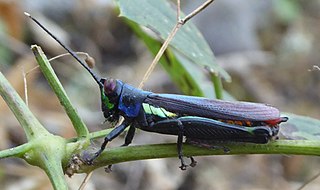
Proctolabus is a genus of short-horned grasshoppers in the family Acrididae. There are about eight described species in Proctolabus, found in Mexico and the southwestern United States.

Titanacris is a genus of large grasshoppers in the subfamily Romaleinae and tribe Tropidacrini. They are found from southeastern Mexico, through Central and South America, ranging south to northernmost Argentina.

The Ommatolampidinae are a subfamily of grasshoppers in the family Acrididae, found in central and South America, and based on the type genus Ommatolampis. Derived from the "Ommatolampides" used by Brunner von Wattenwyl in 1893, the first use of the name in its current form was by Rodríguez et al. in 2013; this taxon appears to be paraphyletic.
















